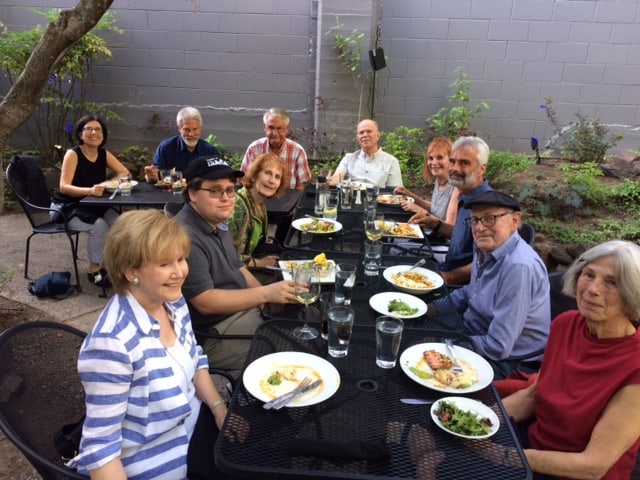SOF’s July Forum in Ashland, Oregon: A Big Hit

The Shakespeare Oxford Fellowship’s day-long Forum at Hannon Library on the campus of Southern Oregon University in Ashland was held on July 9, 2018. Over 50 local residents and interested parties travelled from as far away as Washington, D.C. to enjoy the event. The faculty were treated to productions of both Henry V and Love’s Labour’s Lost at the award-winning Oregon Shakespeare Festival (OSF) on the day before the program. The Forum, as was the case for the SOF summer seminar in 2016, focused on the plays in production in Ashland this season.
Ramon Jiménez led off the presentations with “Henry V – Sources, Dates, and Venues,” a reprise of his paper delivered at the Shakespeare Oxford Fellowship conference in 2016, a video of which is available on the SOF website. Jiménez’s study of literary and historical evidence, Shakespeare’s Apprenticeship, Identifying the Real Playwright’s Earliest Works, is scheduled to be published by McFarland, Inc. in September.
Next to present was Bonner Cutting, whose paper, “The Editors of Shakespeare’s First Folio: Hiding in Plain Sight?”, developed the web of relationships between the “incomparable pair,” the Earls of Pembroke and Montgomery, Ben Jonson, and the other contributors to Shakespeare’s First Folio. Bonner’s presentation was meticulously detailed, in stark contrast to the popular, highly sentimental, feminist fantasy that is Lauren Gunderson’s The Book of Will, in production all summer at OSF. Cutting has also nearly completed working on a collection of essays for publication, Necessary Mischief: Exploring the Shakespeare Authorship Question.
The morning session concluded with David Rains Wallace speaking on “Shakespeare’s Wilderness.” Wallace has published more than twenty books on conservation and natural history, including The Klamath Knot, for which he received the John Burroughs Medal, “a classic of natural history that will take its place alongside Walden and A Sand County Almanac.” Wallace has written articles for the National Geographic Society, The Nature Conservancy, The Sierra Club, Harper’s Magazine, The New York Times, Wilderness and other periodicals. His most recent work, Shakespeare’s Wilderness, was published in 2017.
During the two-hour lunch break, participants were treated to an exhibit of playwright folios and other rare 16th and 17th century texts from the Margery Bailey Collection at Hannon Library. The exhibit included Shakespeare’s Fourth Folio, Ben Jonson’s Folios, the Fletcher and Beaumont Folios, Holinshed’s Chronicles, Hall’s Chronicle, North’s translation of Plutarch’s Lives, and William Camden’s Britannia.
Rima Greenhill presented on “The Masque of Muscovites Revisited.” Greenhill is a Senior Lecturer in Russian language in the Department of Slavic Languages and Literature at Stanford University, and is a recipient of several teaching awards, among them the Dean’s Award for Distinguished Teaching. Ten years ago, Rima turned her attention to the subject of international relations during the Early Modern era with a special focus on trade and diplomatic relations between England and Russia under the Tudors and the Stuarts. She has just completed a new interpretation of Love’s Labour’s Lost which elucidates many heretofore opaque Russian references and relationships. Her astonishing research proved to be a revelation for a number of participants.
Earl Showerman concluded the presentations with his paper, “Hercules in Shakespeare’s Labours of Love.” Over the past decade Earl has presented a series of papers and published on the topic of Shakespeare’s Greek dramatic sources, and contributed a chapter on Shakespeare’s medical knowledge in Shakespeare Beyond Doubt? – Exposing an Industry in Denial, as well as several topics in Know-It All-Shakespeare (2017). His arguments focused on the significance of the numerous allusions to Hercules in Love’s Labour’s Lost and Much Ado About Nothing.
The session concluded with an open-ended hour-long panel discussion and question-and-answer session with the Forum faculty. The faculty had a great time and committed to supporting future programs in Ashland which explore the fascinating Shakespeare authorship question. The comments of participants reflect the overall reception of the SOF program:
“Anyone attending the Shakespeare Oxford fellowship Forum in Ashland on July 9th could be assured there is no grand conspiracy of authorship doubters. The presentations were about as provocatively diverse as Shakespeare’s own works. All delved into areas that have not been much developed in the past, and reflected the genuine, scholarly inquiry and open-mindedness of their authors.” — Diana Reynolds Roome
“To see magnificent productions of Shakespeare at the Oregon Shakespeare Festival and have them deepened by Authorship scholars coming to Ashland and speaking on the same day — this is the high point of the season! Thank you to Earl and the traveling scholars for making this happen.” — Linda Madge Thomas
“Thank you very much for organizing a most interesting Shakespeare Symposium last Monday. The day was very informative, interesting, and challenging.” — Jean Conger
“An impressive educational experience. I’m better educated, informed, and motivated!! We’re so fortunate to have your passion and expertise right here on our Ashland horizon. You’ve launched me on a formidable journey.” — Ann Bard
“Not often encountered in a series of talks, every presentation in this fast-moving educational event was an engaging breath of fresh air, and packed with a kind of knowledge only available when the history of literature is connected to the history of the people who created it. It was one ‘Ah-ha’ moment after another.” — Scott Fanning
The SOF commends Earl Showerman for organizing the event and all who participated.
Membership dues cover only a fraction of our budget, including all our research, preservation and programming. Please support the SOF by making a gift today!
Blue Boar Tavern: Wassail Q&A
Tuesday Dec. 17, 8pm E / 5pm P
Sign up below for event invites!
